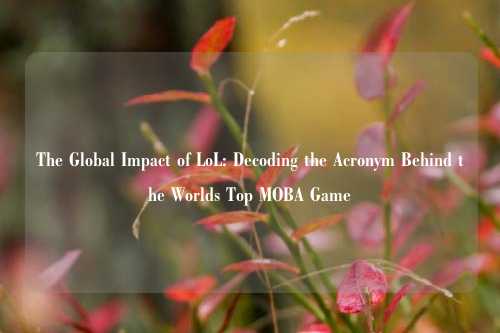The acronym "LoL" is instantly recognizable to millions of gamers worldwide. While it colloquially stands for "laugh out loud" in internet slang, in the gaming universe, it represents something far more significant: League of Legends, the iconic multiplayer online battle arena (MOBA) game developed by Riot Games. Since its release in 2009, LoL has become a cultural and competitive powerhouse, shaping esports, streaming culture, and online communities.
The Birth of "LoL" as a Gaming Giant
League of Legends (abbreviated as LoL) emerged during the golden age of MOBAs, inspired by the Defense of the Ancients (DotA) mod for Warcraft III. Riot Games streamlined the genre, making it more accessible while retaining strategic depth. The shorthand "LoL" quickly became the game’s universal identifier, distinguishing it from other titles and even overshadowing its original internet slang meaning in gaming circles.

"LoL" in Esports and Pop Culture
The LoL esports scene, particularly the League of Legends World Championship, has turned the game into a global spectacle. Events like Worlds attract viewership rivaling traditional sports, with teams like T1 (featuring legendary player Faker) becoming household names. The acronym "LoL" is now synonymous with competitive gaming excellence, appearing in headlines, sponsorships, and even mainstream media.
The Linguistic Impact of "LoL"
The dual meaning of "LoL" creates occasional confusion. A message like "I just won my LoL match!" could baffle non-gamers expecting a joke. Yet, this overlap highlights how gaming language permeates broader communication. Riot Games embraced the ambiguity, often using humor in marketing (e.g., "LoL means both, depending on whether you’re winning or losing").
Beyond the Game: "LoL" as a Community
"LoL" isn’t just a game—it’s a social ecosystem. From memes ("Report my team, LoL") to streaming platforms like Twitch, the acronym binds players across languages. Spin-offs like Teamfight Tactics (TFT) and Legends of Runeterra further expand the "LoL" universe, proving its lasting influence.
Conclusion: More Than Letters
The simplicity of "LoL" belies its impact. What began as an abbreviation now represents a decade of innovation, rivalry, and camaraderie. Whether you’re a casual player, a die-hard fan, or someone who still thinks it means "laugh out loud," League of Legends—and its iconic acronym—has undeniably left its mark on digital culture.
Final Thought: Next time you see "LoL," ask yourself: Is it laughter, or is it legend? For millions, the answer is both.
Word Count: ~450
Keywords: LoL, League of Legends, MOBA, esports, Riot Games, gaming culture